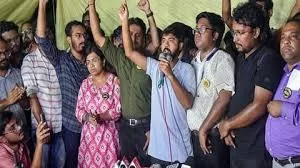Geneva, Switzerland – Countries negotiating a global agreement on handling future pandemics began an extra week of talks on Monday, with World Health Organization (WHO) Director-General Tedros Adhanom Ghebreyesus expressing optimism that a conclusion is near.
The negotiations, held at the WHO headquarters in Geneva, come three years after the decision was made to draft a new international accord on pandemic prevention, preparedness, and response, prompted by the devastating impact of COVID-19.
“You should be proud of what you have achieved in the past three years, and you should also be confident that the end is in sight. It’s closer than you think,” Tedros told negotiators from the WHO’s 194 member states. He added, “I believe that you can finalize the pending issues before the end of this year.”
The timeline is notably swift, given the typically slow pace of international treaty negotiations. While countries broadly agree on the goals of the agreement, significant disagreements remain on the details.
“For the pandemic agreement to be meaningful, you need provisions for strong prevention, continued preparedness, and robust, resilient, and equitable response,” Tedros warned. “An imbalanced pandemic agreement is not an agreement.”
The current round of talks is an extension of the 12th round of negotiations held from November 4 to 15. This week, discussions are focused on key issues such as research and development, sustainable financing, and the transfer of technology and knowledge needed to produce pandemic-related health products. A central point of debate remains the proposed pathogen access and benefit-sharing system.
On Friday, negotiators will assess the progress made and decide whether to convene a special session of the World Health Assembly to adopt a finalized agreement. Such a session would take 35 days to arrange.
With the U.S. presidential election looming, negotiators are mindful of the potential return of former President Donald Trump, who has previously expressed hostility toward the WHO. During his first term, Trump initiated the U.S.’s withdrawal from the organization, accusing it of being overly influenced by China.
Precious Matsoso, co-chair of the negotiations, expressed hope that this week’s talks would “resolve most of the issues.” Her co-chair, Anne-Claire Amprou, called the week “crucial for the advancement of our work,” urging countries to approach the talks with pragmatism, flexibility, and realism. “This is becoming urgent,” she said.
One of the key divisions in the talks lies between Western nations with strong pharmaceutical industries and developing countries, which fear being marginalized when future pandemics occur. The International Federation of Pharmaceutical Manufacturers and Associations (IFPMA) has called for a pandemic treaty that allows the private sector to innovate and respond effectively. However, the UK-based charity Oxfam has raised concerns that the treaty could prioritize the financial interests of pharmaceutical companies over global health and equity.
The Panel for a Global Public Health Convention emphasized the importance of a comprehensive agreement to protect both health and the economy globally. “We just urge you to keep it up and please get this done,” the panel stated.
As the clock ticks toward a final deal, negotiators face mounting pressure to finalize an agreement that will help prevent and mitigate the impact of future pandemics, balancing the interests of various stakeholders and ensuring that global health is prioritized.












